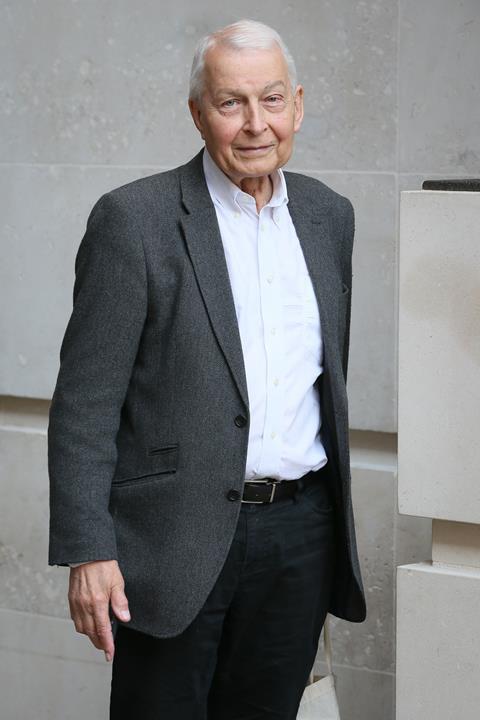The former Labour minister Frank Field, has died aged 81. As passionately committed to social justice as he was the Book of Common Prayer, Lord Field of Birkenhead crossed political boundaries but was admired by both sides, says the Bishop of Whitby

Since the death of Frank Field on Tuesday, many have commented on his social and political passions, the impossibility of pigeon-holing him within the party system, his surprising views on a range of subjects, his insistence on the moral and financial obligations that all individuals should accept (including criticism of the excesses of property ownership), his reforming energy and his devotion to the Book of Common Prayer.
Above all, Frank defied simple political labels of left and right. And consistently, those comments tell of how he was genuinely loved and respected despite deep differences.
Born in Edmonton, Middlesex, Field moved north to study economics at the University of Hull. As a graduate, he led the Child Poverty Action Group and the Low Pay Unit. In 1979, he was selected to stand for Labour in my home town of Birkenhead, facing Liverpool over the Mersey, and his 40-year tenure as its MP began.
A turbulent career
Frank was never the darling of the militant socialist element in the local Labour party; perhaps, paradoxically, that endeared him to many voters. We saw him stand up for the constituency and its people, many of whom were sorely affected by deprivation.
His early years as an MP were those of social and industrial unrest, and the traditional big industries - critically, for Birkenhead, including shipbuilding - were vulnerable. From Frank’s desk came a stream of writings on social issues, poverty and economics.
Some of his less likely political friendships were based on spiritual sympathies
He thought deeply and was, in many ways, best when working in an intellectual cell. A journalist once described him as a “policy expert but ministerial failure”, begging the question of whether it was Frank or the structure that really failed.
Tony Blair appointed him as minister for welfare reform, working under Harriet Harman as secretary of state, but the combination was not successful. Frank’s radical proposals of different models for funding benefits dismayed Blair and his chancellor, Gordon Brown.
As a result, his ministerial career was short, with his seniors pointedly leaving the Commons chamber rather than hear his resignation speech: “If the last 15 months have taught me anything, it is that the biggest of all reforms requires not only an executive position for a person with convictions about welfare reform, but also the Cabinet, and especially the Chancellor, to share beliefs about that common endeavour.”
A passion for justice
Frank’s passions, and the trust in which he was held across the political spectrum, saw him commissioned by David Cameron in 2010 to conduct a review into poverty. Drawing attention to the scandal that being born into poverty quickly limits health and life opportunities, he was disappointed by what he saw as the Government’s failure to act on his report and established an all-party group on hunger and food poverty. He chaired the Work and Pensions Select Committee, using his ability to call powerful individuals and organisations to account.
Always for Frank, politics had to be ethical. His respect for, and controversial friendship with Margaret Thatcher was rooted in his view that she was “the first prime minister since Gladstone to address the big moral questions.” Free movement of the labour force throughout the European Union, he decided, was detrimental to British workers lacking the capacity for skilled work, for which reason it was right to leave it. His conclusion exasperated Remainers but he stood by the logic of his argument. After a break with Jeremy Corbyn’s Labour party, he stood unsuccessfully as an independent candidate in 2019, after which he had a seat in the Lords.
Serving the Church
Frank was a committed member of the Church of England and relished its sacramental life. Throughout a period of liturgical changes within the Church, he held fast to the Authorized Version of the Bible and the Book of Common Prayer - again, some of his less likely political friendships were based on spiritual sympathies.
He was an honorary lay canon of the Province of York and was, for a time, a member of General Synod and Parliament’s Ecclesiastical Committee, another setting for him to exercise his skills of governance. As chair of the Social Services Select Committee, he pressed the grandees of the Church Commissioners hard on their policies, including on investment in apartheid-era South Africa.
Always for Frank, politics had to be ethical
At his death, he was The Right Honourable Lord Field of Birkenhead, Companion of Honour. But to thousands in Birkenhead - and elsewhere - he was simply Frank. It has been remarked that politics needs more people like Frank Field. In his principles, yes, but our system as it is today would need to be much reformed to draw the best out of someone of his kind.
We shall miss this extraordinary man - a delight to meet, who found solace in faith, Mozart and RS Thomas, and who would sometimes slip through the back door of Westminster Abbey to hear us sing the litany.
































No comments yet